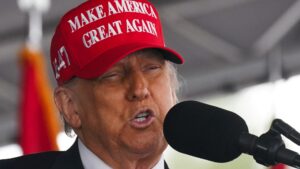Trade Talks: A Closer Look at the U.S.-EU Negotiations
In today’s dynamic global marketplace, trade relationships shape economies and influence political landscapes. Recently, former U.S. President Donald Trump highlighted key developments in the ongoing trade discussions with the European Union (EU), signaling potential positive shifts in this vital economic alliance.
Positive Steps Toward Agreement
On May 24, 2025, during a commencement ceremony at West Point Military Academy, Trump announced he was intently monitoring "positive" advancements in trade negotiations with the EU. This announcement came as he agreed to postpone a substantial 50% tariff on imports from the bloc until July 9. The decision to delay has sent ripples of optimism throughout the markets, which had been rattled by the prospect of such significant tariffs.
Trump took to his Truth Social platform, stating, “I have just been informed that the E.U. has called to quickly establish meeting dates. This is a positive event, and I hope that they will, FINALLY, like my same demand to China, open up the European Nations for Trade with the United States of America.” This declaration not only reveals Trump’s perspective but also showcases his continued assertiveness in advocating for U.S. trade interests abroad.
EU Responses and Timeline Ahead
The desire for a breakthrough in negotiations was underscored by remarks from EU Commission President Ursula von der Leyen, who expressed readiness to advance discussions "swiftly and decisively" in a post on social media platform X. Similarly, European Trade Commissioner Maros Sefcovic communicated a collaborative spirit, sharing that he had "good calls" with U.S. Commerce Secretary Howard Lutnick and emphasized a commitment to maintaining constant communication.
The environment around these negotiations is particularly charged; the stakes are high, not just for the U.S. and EU but also for global markets that react to trade tensions. The hope for a more harmonious trade relationship has the potential to stabilize and even invigorate economic conditions in both regions.
What This Means for Investors and the Economy
As we observe these developments, investors must remain vigilant. A successful trade deal could pave the way for increased exports and a flourishing economic environment, significantly boosting sectors such as manufacturing and technology.
At Extreme Investor Network, we advocate for proactive investment strategies tailored to evolving economic landscapes. Here are a few considerations for investors in light of the latest news:
-
Diversification: With potential volatility in mind, explore diverse asset classes, particularly in sectors likely to benefit from reduced tariffs or expanded trade negotiations.
-
Market Trends: Watch for shifts in market sentiment; the optimism surrounding trade talks can impact stock prices, especially in multinational companies heavily invested in trade with Europe.
- Stay Informed: Continuous engagement with market analyses and updates will provide you with insights that are essential for timely investment decisions.
Conclusion
The current trade discussions between the U.S. and EU signify more than negotiations over tariffs; they represent a defining moment in international trade relations. As conversations evolve and strategies unfold, keeping an ear to the ground can arm investors with the insights needed to navigate future challenges and opportunities.
Stay tuned for further updates on this developing story, as the landscape of international trade continues to shift in response to diplomatic efforts—critical information that could greatly influence your investment decisions.
At Extreme Investor Network, we are committed to bringing you the latest insights and actionable strategies to thrive in these ever-changing markets.

